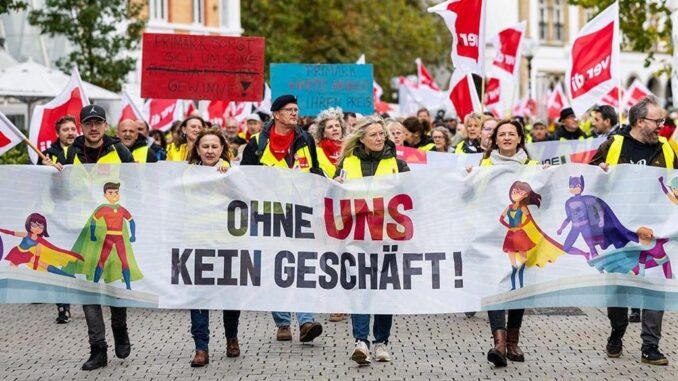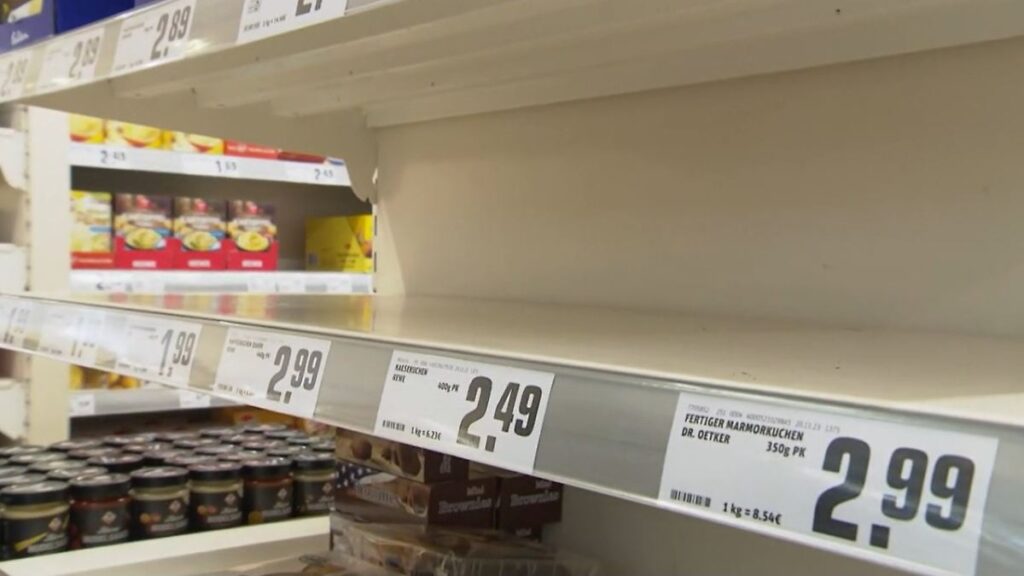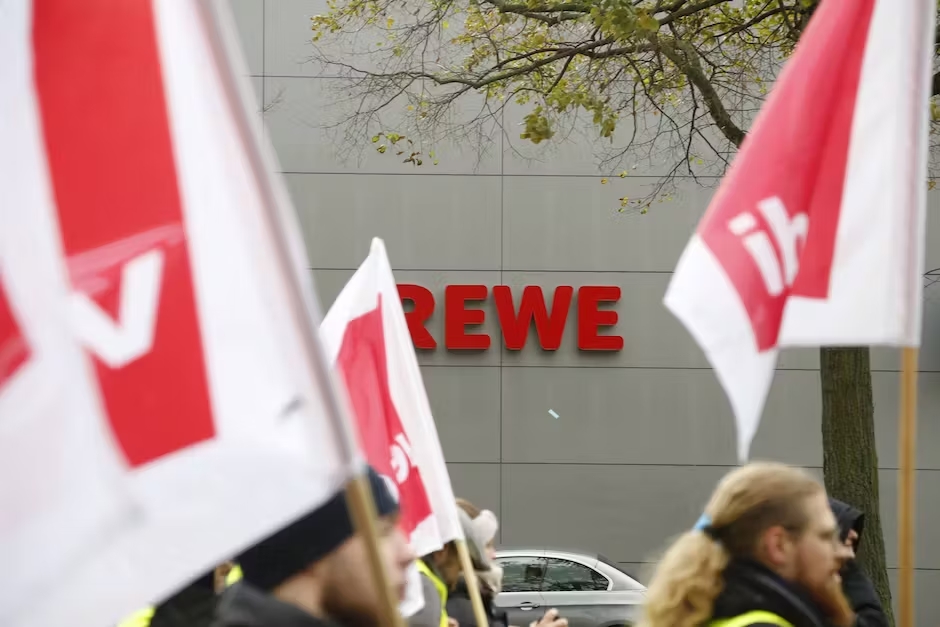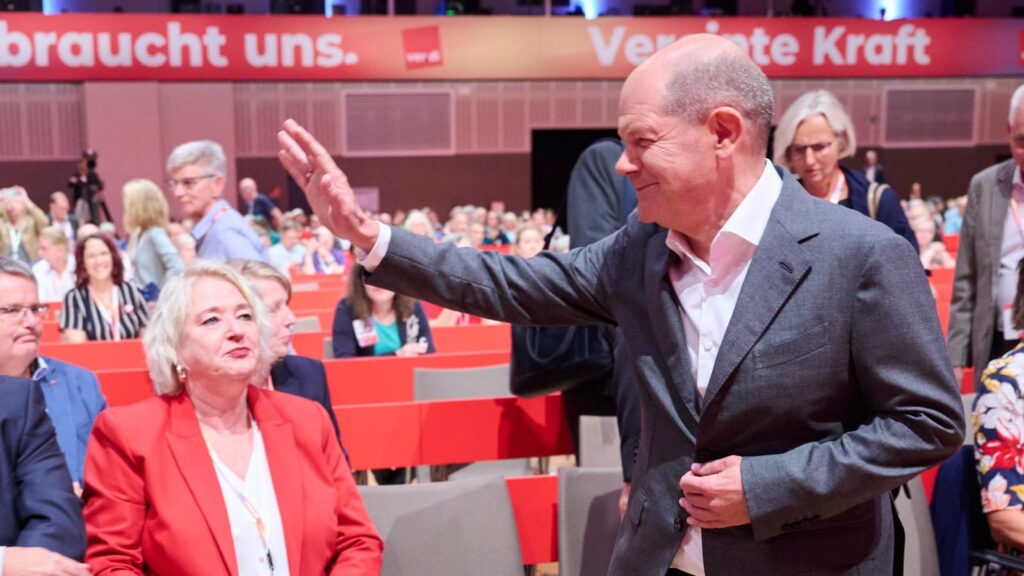
Again without any agreement: after long confrontations, the union and the employers did not reach any conclusion for the sector during the last collective bargaining of the year in Hamburg. A solution could have set the tone for future negotiations at the national level. Still, the working class does not give up.
By Carolina Menéndez Trucco
Missing products, empty shelves and strike employees in large supermarket chains, among other stores, in several federal states. Days before Christmas, this is how the retail market looked like throughout Germany. In the middle of the European winter, someone might have asked: is it Coronavirus again? However, this has nothing to do with disruptions to supply chains caused by the pandemic or the consequences of war. The protests and the delivery bottleneck were to be expected for other reasons; the union organization had already anticipated it months before in the face of the inflexible position of the employers. After repeated strikes for months and 60 rounds of fruitless collective bargaining between the German Retail Association (HDE) and the Ver.di union (United Services Union), the employers’ association set a deadline: December 28, 2023, in Hamburg as the last opportunity for rapprochement.

After a pause of a week, discussions began on the morning of that Thursday. The fact that the negotiations continued hours later was initially taken as a positive sign, but in the end it culminated in another new disappointment. The rich port city ends the year with bad news for the retail working class. While the agreement was only going to affect the Hamburg tariff zone, the compromise could have served as a model for future agreements in the 14 collective bargaining districts across the country, where higher wages have been fought for more than eight months. The employers considered the round as “the last chance for an agreement before the end of the year.“
But the working class does not give up. Faced with the imposition of deadlines and tariffs, the head of the retail sector at the Ver.di federal Executive Board, Corinna Groß, assured: “We do not accept collective bargaining dictates!” Therefore, it is now only possible to reach a conclusion if there is a better employer offer.

A long-standing dispute
The conflict in retail trade has been going on for a long time. Employees in the sector have been fighting and striking for higher wages for months. Many employees currently earn little more than minimum wage. The union demands, among other things, at least 2.50 euros more per hour in all regions and a period of one year. Depending on the state, there are additional requirements. Employers say they offer a good 10% salary increase spread over two years. But according to Ver.di, this would only mean an increase of 1.04 euros in 2023. “Based on a term of two years, just 1.78 euros. That’s not even half of what the employees are demanding to make ends meet during the crisis,” criticized Silke Zimmer from the union’s federal executive board.
During the negotiations in Hamburg, Ver.di and the Northern Trade Association (the local employers’ association) could not reach an agreement. According to the German Retail Association (HDE), the negotiations failed again “due to the union’s exaggerated ideas.” While Ver.di accused the other side of not having improved its previous offer. “The employers haven’t moved, that means a loss of real wages for the employees,” the union said. What then remains after this arduous wage dispute, apart from empty shelves and a Santa Claus with less weight on his back? To achieve a fairer agreement, 2024 will probably begin with more protests in businesses throughout the country…
Politics on stage
With few words and half a smile, Social Democratic Chancellor Scholz asked during his time at the last Ver.di Federal Congress for a clear stance against right-wing populism. A month later, he shook hands with Italy’s far-right prime minister, Giorgia Meloni, in the German Chancellery. Undoubtedly, it is not enough to proclaim the fight against the right if diplomatic relations are then maintained with them, even with genocidal states like Israel.

But unfortunately, the astonishment sometimes seems infinite. It is “a good sign that we have improved the welfare state security in Germany during these times,” Scholz said at the union congress. Now, the welfare state devastated after the pandemic, the budget crisis, the government’s austerity policy and the social cuts that have left so many unprotected on the streets do not appear on the chancellor’s scale.
A test of strength
The bureaucratic-reformist leadership of the large unions is often closer to the employers than to the workers in negotiations. The German Trade Union Confederation (DGB), the umbrella organization that encompasses eight, including Ver.di, should give more signals by acting in favor of the entire working class. The consultation and democratic decision of the bases, the consistent mobilization for demands, solidarity and coordination with other sectors in struggle, will help to develop a combative union wing.
In an inflationary context, fair wages are a fundamental right. In German retail in particular, as it is an area where working conditions are often more precarious. For this reason, it is strategic that the labor movement plays an increasingly solid role. You would only have to take a look at its great struggles from May 1st to the recent ones in the American automotive sector to remember the power of the working class. In Germany, retail trade is still standing.








